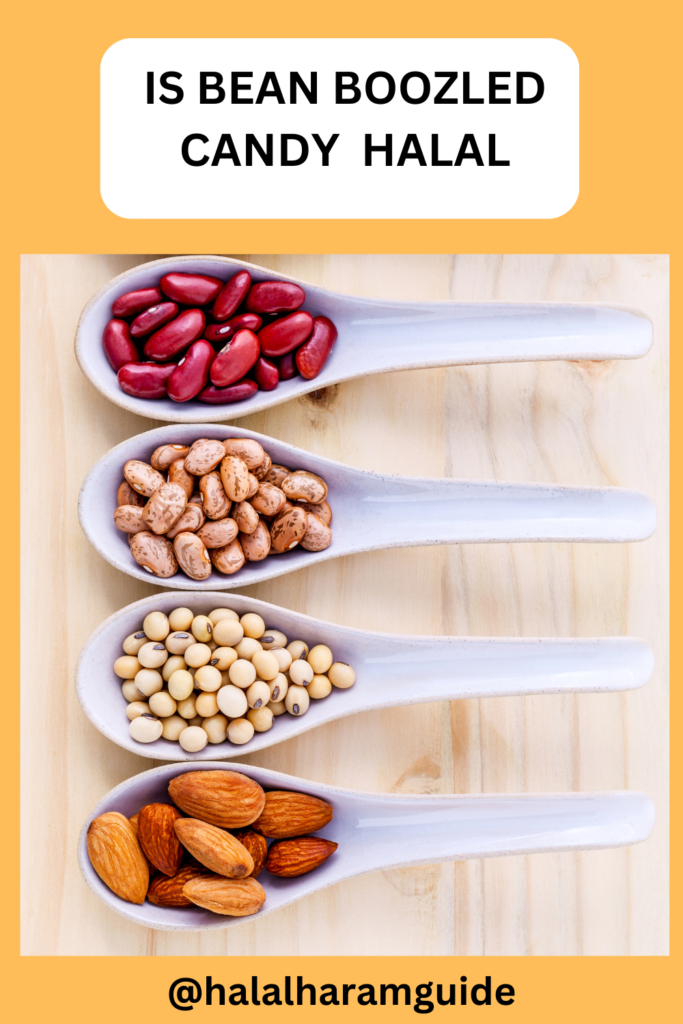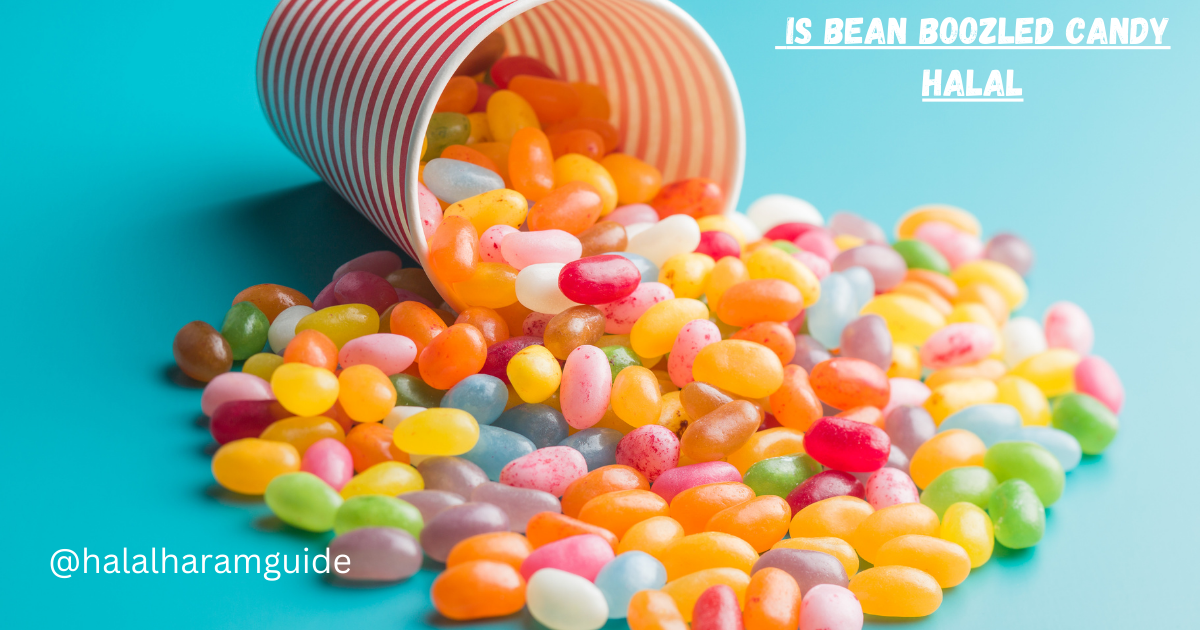In the realm of sweet indulgences, many candy enthusiasts and those adhering to halal dietary principles have pondered, “Is Bean Boozled candy halal?”
This question arises from the desire to enjoy these popular and flavorful jelly bean candies while remaining faithful to Islamic dietary laws. Jelly Belly, known for its vast array of delectable flavors, and Bean Boozled, renowned for its daring and sometimes eccentric taste experiences, have earned a special place in the world of confectionery. But for those who follow halal dietary guidelines, understanding the halal status of these candies is crucial.
In this blog post, we delve into the intricacies of Jelly Belly and Bean Boozled candies, exploring whether they align with halal principles and providing insights for those seeking to make informed dietary choices.
What is jelly belly and bean boozled candy?
Jelly Belly and BeanBoozled are popular brands of jelly bean candies known for their unique and varied flavors. Here’s more information about each:
Jelly Belly:
Jelly Belly is a well-known brand of gourmet jelly beans. These jelly beans come in a wide range of flavors, including traditional fruit flavors like cherry, lemon, and watermelon, as well as more exotic and unusual flavors such as buttered popcorn, toasted marshmallow, and root beer. What sets Jelly Belly apart is its commitment to creating authentic and intense flavors that closely mimic the real taste experiences. They are often used for snacking, as party favors, or even for gourmet taste-testing.
BeanBoozled:
BeanBoozled is a fun and sometimes daring spin-off of Jelly Belly, produced by the same company. BeanBoozled jelly beans come in pairs, with each pair having one jelly bean that tastes like a traditional, delicious flavor and another that has a wild, unexpected, or even bizarre taste. For example, one pair might include a jelly bean that tastes like coconut and another that tastes like spoiled milk. The challenge and entertainment come from not knowing which flavor you’ll get when you pick a jelly bean of a particular color. BeanBoozled has gained popularity for its “game of chance” aspect, where friends or family members take turns trying the jelly beans and reacting to the surprising flavors.
Is Jelly Belly And Bean Boozled Candy Halal?
The halal status of Jelly Belly and Bean Boozled candy can be a subject of debate and scrutiny among Muslims due to the wide range of flavors, some of which may contain ingredients that require careful consideration. Whether these candies are considered halal or not may depend on several factors, including the specific ingredients used, the presence of alcohol-based flavorings or additives, and individual dietary preferences.
It’s important for individuals seeking halal products to check the ingredient lists and labels of Jelly Belly and Bean Boozled candy. While some flavors may contain ingredients that are commonly considered halal (such as fruit juices and natural flavors), others may include additives or flavorings that raise concerns.
If you have specific dietary restrictions or preferences based on your understanding of halal dietary laws, it’s advisable to consult with your local religious authority or a knowledgeable scholar who can provide guidance on whether specific flavors or ingredients within these candies align with your dietary principles. Additionally, some organizations offer halal certification for food products, and it may be helpful to look for candies with such certification to ensure they meet your dietary requirements.
Does Bean Boozled Contain Gelatin?
BeanBoozled candies, produced by Jelly Belly, do not contain gelatin. These jelly bean candies are known for their unique and sometimes unusual flavors, but they are not made with gelatin, which is a common ingredient in many gummy candies and marshmallows.
Instead, Bean Boozled jelly beans primarily consist of sugar, corn syrup, modified food starch, and a variety of flavorings and colorings. While the flavor assortment can include unconventional and often surprising tastes, gelatin is not among the ingredients used in the production of BeanBoozled candies.
This characteristic may make Bean Boozled more accessible to individuals who have dietary restrictions or preferences that exclude gelatin from their diet. However, as with any food product, it’s advisable to check the ingredient label to ensure it aligns with your specific dietary requirements or restrictions.
Does Jelly Belly Contain Alcohol?
Jelly Belly candies do not typically contain alcohol as an ingredient. The primary ingredients in Jelly Belly jelly beans are sugar, corn syrup, modified food starch, and a variety of natural and artificial flavorings and colorings.
While some flavors may mimic the taste of alcoholic beverages (such as “Piña Colada” or “Margarita” flavors), they do not contain actual alcohol. These candies are designed to provide a range of flavors, including those that simulate the taste of various foods and beverages, without the presence of alcohol.
However, it’s essential to read the ingredient labels and check for any specific flavor variations that may have unique ingredients to ensure that they align with your dietary preferences or restrictions.
What Are The Halal Ingredients Used In Jelly Belly & Bean Boozled Candy?
Jelly Belly and Bean Boozled candy typically do not contain any haram (forbidden) ingredients such as pork-derived gelatin or alcohol. However, the specific ingredients used in individual flavors can vary, and some flavors may include ingredients that require closer scrutiny from a halal dietary perspective. Here are some common halal ingredients used in these candies:
Sugar: Sugar is a common sweetener in candies, including Jelly Belly and Bean Boozled. Sugar is generally considered halal.
Corn Syrup: Corn syrup is used as a sweetener and binding agent in many candies and is generally considered halal.
Modified Food Starch: Modified food starch is used as a thickening agent in candies. It is typically derived from corn and is considered halal.
Natural and Artificial Flavorings: The flavorings used in these candies can vary widely, but they are typically derived from plant sources and do not contain alcohol or haram ingredients.
Fruit Juices: Some flavors may contain fruit juice concentrates for flavor. Fruit juices are halal when they come from permissible fruits.
Food Colorings: Food colorings used in candies are usually synthetic and do not contain haram ingredients.
List of Jelly Bean Flavours
Jelly Belly, known for its wide variety of jelly bean flavors, offers an extensive assortment of flavors. While the selection may change over time, here is a list of some classic and unique Jelly Belly jelly bean flavors:
Very Cherry
Buttered Popcorn
Licorice
Coconut
Juicy Pear
Cinnamon
Watermelon
Blueberry
Green Apple
Tutti-Fruitti
Sizzling Cinnamon
Grape
Lemon
Peach
Toasted Marshmallow
Why Is Gelatine Haram?
Gelatin is considered haram (forbidden) in Islam for several reasons:
Source of Gelatin: Gelatin is a protein derived from the skin, bones, and connective tissues of animals, primarily cows and pigs. The Islamic dietary laws require that animals be slaughtered in a specific manner (halal slaughter) to be considered permissible for consumption. Gelatin is often derived from non-halal sources, making it problematic from a halal perspective.
Halal Slaughter Requirements: Halal slaughter involves pronouncing the name of Allah (God) at the time of slaughter, as well as ensuring that the animal is healthy and alive at the time of slaughter, among other requirements. Gelatin is typically produced from the byproducts of animals that do not meet these halal slaughter criteria.
Impurity (Najis): Some Islamic scholars consider the entire pig to be impure (najis) in Islam, and its consumption is strictly forbidden. Since gelatin can be derived from pig sources, it is considered impure and haram by extension.
Avoidance of Haram Ingredients: Islamic dietary laws also prohibit the consumption of products that contain haram ingredients or additives. Gelatin is used as an ingredient in various food and non-food products, including candies, desserts, and pharmaceuticals. Avoiding products containing gelatin is a way to ensure that haram ingredients are not consumed.
Conclusion
In conclusion, determining the halal status of Jelly Belly and Bean Boozled candy requires careful consideration of the specific flavors and ingredients used in these beloved treats. While some varieties may contain ingredients of concern from a halal perspective, others may align with halal dietary principles.
To make informed choices, individuals following halal guidelines should scrutinize ingredient labels, seek guidance from halal certification authorities, or consult knowledgeable religious scholars. With these precautions, candy enthusiasts can enjoy these confections while ensuring their consumption aligns with their halal dietary preferences and beliefs.
Frequently Asked Questions:
Q1. Can Muslims Eat Jelly Belly Jelly?
Muslims can consume Jelly Belly jelly beans if they are made with halal ingredients and do not contain any haram (forbidden) ingredients. The permissibility of Jelly Belly candies depends on the specific flavors and ingredients used. Some Jelly Belly jelly bean flavors may contain alcohol-based flavorings or other ingredients that require careful scrutiny from a halal perspective. Therefore, Muslims should check the ingredient labels and consider the guidance of halal certification authorities or knowledgeable religious scholars to determine whether specific Jelly Belly jelly beans align with their dietary preferences and halal principles.
Q2. Are Jelly Beans Vegan?
Not all jelly beans are vegan, as some may contain ingredients like gelatin or colorings derived from animal sources. However, there are vegan-friendly jelly beans available in the market, including some brands that offer vegan versions of classic jelly bean flavors. These vegan jelly beans typically use plant-based ingredients and colorings and do not contain gelatin or other animal-derived additives.
Q3. Are Jelly Bellies Candy Halal?
Whether Jelly Bellies candies are considered halal or not depends on the ingredients and flavors used in the specific candies. Some Jelly Bellies flavors and products may be suitable for Muslims following halal dietary guidelines, while others may contain ingredients of concern. It’s advisable for Muslims to carefully read the ingredient labels and, if available, seek out products that have been certified as halal by reputable halal certification authorities.
Q4. Are Jelly Beans Halal?
The halal status of jelly beans, including Jelly Belly and other brands, can vary depending on the ingredients and production methods used. Jelly beans may contain ingredients like gelatin, which is derived from non-halal sources and is considered haram by many Muslims. However, some brands offer jelly beans that are specifically formulated to be halal, using plant-based ingredients and avoiding haram additives. Muslims seeking halal jelly beans should look for products with halal certification or carefully check the ingredient labels to ensure they align with their dietary preferences and halal principles.
- “Is Lobster Halal? Understanding Its Permissibility”
- “Is Drawing Haram in Islam? Understanding the Perspective”
- “Is Fermented Kimchi Halal? Exploring Kimchi’s Halal Status”
- “Is Collagen Halal? Unveiling the Halal Status of Collagen”
- “Is Wine Vinegar Halal? Unveiling Its Permissibility”


